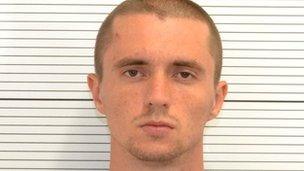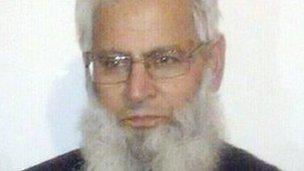Mosque bomber Pavlo Lapshyn given life for murder
- Published

Pavlo Lapshyn told police he wanted to "increase racial conflict" in the community
A Ukrainian student has been jailed for at least 40 years for murdering an 82-year-old man and plotting explosions near mosques in racist attacks.
Pavlo Lapshyn stabbed Mohammed Saleem in Small Heath, Birmingham on 29 April, five days after arriving in the UK.
On Monday, Lapshyn, 25, admitted murder as well as plotting to cause explosions near mosques in Walsall, Tipton and Wolverhampton in June and July.
At the Old Bailey, he was told he would be jailed for life.
Mr Saleem was stabbed to death, just yards from his home, after attending prayers at his local mosque in Green Lane.
Lapshyn, from Dnipropetrovsk in Ukraine, was living in Birmingham while on a temporary work placement in the city when he killed Mr Saleem, a grandfather of 22.
He later planted three bombs near mosques in the West Midlands as part of a campaign he said was motivated by racial hatred.
He was arrested almost a week after an explosion in Tipton.
'Hated non-whites'
The third device, which exploded near the Kanzul Iman mosque in Tipton on 12 July, was packed with nails.
Police said it was only because Lapshyn got the wrong time for Friday prayers that the blast did not cause mass injuries.
Sentencing, Mr Justice Sweeney told him: "You clearly hold extremist right-wing, white supremacist views and you were motivated to commit the offences by religious and racial hatred in the hope that you would ignite racial conflict and cause Muslims to leave the area where you were living.
"Such views, hatred and motivations have no place whatsoever in our multi-faith and multi-cultural society."

Mohammed Saleem was murdered less than a week after Lapshyn arrived in the country
He added Lapshyn held "views abhorrent to all right-thinking people which have no place in our multi-cultural society".
During interviews, Lapshyn told police he had murdered the grandfather of 22 because he hated "non-whites".
Prosecutor Peter Wright QC told the Old Bailey that PhD student Lapshyn had come to the UK on a work placement with software company Delcam.
The firm's sponsorship programme in partnership with the National Metallurgy Academy in Ukraine is now under review following his crimes.
Lapshyn's apartment, above Delcam's offices in Birmingham, were raided by police who found chemicals and bomb-making equipment for another three devices.
'White power'
They also discovered a camera containing 455 photographs and 98 videos. Some of them showed Lapshyn detonating homemade bombs in the Ukrainian countryside. The camera also included shots of him making bombs.
The force's anti-terrorism unit also discovered apparent anonymous notes in the apartment which he planned to use to taunt police.
One featured a photograph of the hunting knife, next to which Lapshyn had written "Mohammed Saleem was killed by".
He also referred to a police reward for information, saying "£10,000 small price, maybe £1m", followed by a smiley face, and the phrase "white power".
The court heard Lapshyn had a video game on his laptop called Ethnic Cleansing and also posed for white a supremacist website with the knife.
Defending, Richard Atkins QC said "we accept that his crimes are grave" and "the appropriate penalty we submit is life with a substantial minimum term".
Mr Atkins told the court that Lapshyn is being kept in segregation and that the only person he speaks to regularly is his father.
In an interview with the BBC, Lapshyn's father, Sergey Lapshyn, said he did not believe his son was a racist.
"Among his acquaintances were people of different ethnic backgrounds, and I have never seen that (racism)," he said.
He added his son could be "a bit tight-lipped" but was not calculating, as police had described him.
Speaking from his home in Dnepropetrovsk, Lapshyn's father confirmed his own mother was a Muslim during her childhood.
Lapshyn's father said his son knew his grandmother was a member of the (largely Muslim) Tatar community at the time of the former Soviet Union.
"We never discussed religious problems and we always considered them to be very intimate," he said.
'Can't move forward'
Mr Saleem's family said their father had not done anything to deserve to die, other than be a Muslim.
In a statement read out in court, Mr Saleem's daughter Shazia Khan said: "The shock and sadness of the reality is impossible to accept, yet alone accept and move on.
"We can't move forward, the murder has disabled our minds in every emotional way possible."
Speaking after the sentencing, Assistant Chief Constable Marcus Beale from West Midlands Police said Lapshyn was "very definitely driven by an extreme right-wing ideology and white supremacist ideology".
Asked to describe Lapshyn's manner in police interview, he said: "He was matter-of-fact, he was cold, he was callous.
"I do not think he has shown any remorse or regret for the crimes that have taken place."

- Published25 October 2013
- Published25 October 2013
- Published25 October 2013
- Published25 October 2013
- Published25 October 2013
- Published25 October 2013
- Published25 October 2013
- Published21 October 2013
- Published21 October 2013